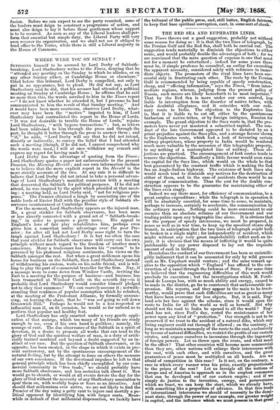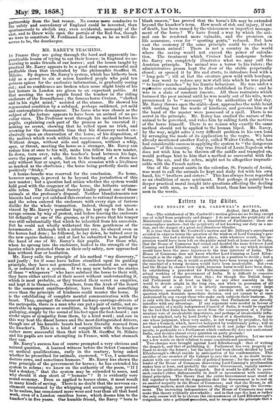THE RED SEA. AND EUPHRATES LINES.
TUE Times throws out a good suggestion, probably not without some reason for doing so : it is that the two lines of telegraph, by the Persian Gulf and the Red Sea, shall both be carried out. The suggestion tends materially to diminish the objections to either route, and would probably double the advantages of both ; for we are convinced that the mere question of expense is one that must not for a moment be entertained ; indeed for some years there must be, if simple prudence be consulted, an outlay far exceeding the apparent necessity, considered solely with reference to imme- diate objects. The promoters of the rival lines have been suc- cessful only in frustrating each other. The route by the Persian Gulf is recommended by being capable of speedy construction, cheap, and " offering information,' says the Times, " from inter- mediate regions, whence, judging from the present policy of Russia, such means are likely henceforth to be most important." That by the Red Sea is more under our own control, less liable to interruption from the disorder of native tribes, with their doubtful allegiance, and it coincides with our ordi- nary route to India. The objection to the Euphrates line is, that it is liable to be cut off, either by the spontaneous barbarism of native tribes, or by foreign intrigues, Russian for example. The grand objection to the Suez route is, that the pro- moters have never yet mustered a subscribed capital. The con- duct of the late Government appeared to be dictated by an priori prejudice against the Suez plan, and a strange favour shown to the Euphrates route, which had a look of favouring certain railway proprietors, whose property in India would be rendered much more valuable by the accession of this telegraphic property, to say nothing of a contemplated line of railway. These ob- jections are practical. The encouragement of both routes tends to remove the objections. Manifestly a little favour would soon raise the capital for the Suez line, which would on the whole be that best guaranteed by the constant traffic which is making the Red Sea an Anglo-Indian highway. The existence of both lines also would much tend to diminish any motives for the destruction of either of them, and in the case of accidents there would be no stoppage of communication. Thus the cost for the double con- struction appears to be the guarantee for maintaining either of the lines even singly. Indeed we say there must, for efficiency of communication, be a great surplus expenditure : while the telegraph is in operation it will be absolutely essential, for some time to come, to maintain, perhaps to increase, certainly to accelerate, the communication by the ordinary means. Nothing could be more convenient to our enemies than an absolute reliance of our Government and our trading public upon any telegraphic line alone. It is obvious that for the purpose of speedy intercourse, we must be prepared, in peace as well as in war time, to keep up the speediest steam-ship transit, in anticipation that the two lines of telegraph might both be broken in a single night ; for independently of accident, which might without any very great improbability inflict such an in- jury, it is obvious that the means of inflicting it would be quite purchasable by any power disposed to lay out the requisite amount of cash in bribery. Heretofore the conduct of our Government has been so unintelli- gibly indiscreet that it can be accounted for only by wild guesses such as Mr. Urquhart would venture ; and the same remark ap- plies to the opposition which " England" has offered to the con- struction of a canal through the Isthmus of Suez. For some time we believed that the engineering difficulties of this work would preclude its execution ; but the investigations which M. Ferdi- nand de Lesseps has with so much ability and energy, caused to be made in the district, go far to counteract that unfavourable im- pression. His reports, and they appear in the main to be trust- worthy, would prove that such difficulties are not so great as many that have been overcome for less objects. But, it is said, Eng- land sets her face against the scheme, since it would open the route to India for all the world as well as herself. But why should not the road to India be opened to all the world ? Eng- land has not, since Peel's day, rested the maintenance of her power upon any kind of "protection." Our strength is not to be preserved if we trust to the accident of a natural dike, which any living engineer could cut through if allowed ; on the contrary, so long as we maintain a monopoly of the route to the east, exclusively by favour of natural difficulties, we restrict the profits of our eastern estates, and expose ourselves io incursions through the ingenuity of foreign powers. Let us throw open the route, and what must be the effect? That other countries will become more commercial than they are, other nations will enlarge their intercourse with the east, with each other, and with ourselves, and the great guarantees of peace must be multiplied on all hands. Are we afraid of competition in this race ? Is it not, on the contrary, a race in which every runner wins his prize, exactly proportionate to the prizes of the rest ? Let us inveigle all the nations of Europe and of America to approach us in the amplest commerce that can be developed out of our eastern empire ; and if we simply do justice to the invention, energy, and perseverance which we boast, we can keep the start, which we already have, with something like a proportion of advance. In that free trade of international intercourse we should of necessity be the domi- nant state, through the power of our example, our greater weight in capital, and the influence which we must possess in that great
partnership from the last reason. No course more conducive to the safety and ascendancy of England could be invented, than spontaneously to abolish any, even accidental, monopoly of the east, and to throw wide open the portals of the Red Sea, though we were to constitute M. Ferdinand de Lesseps, as he so well de- serves to be, the doorkeeper.



























 Previous page
Previous page